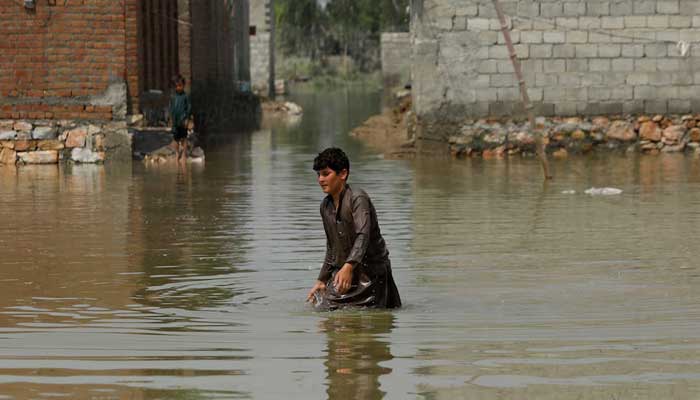Climate hypocrisy
It’s time to listen to the forests being regrown, wetlands being restored and shade being planted
July 12, 2025

They gather in climate-controlled halls, draped in imported fabrics, sipping organic teas flown in from across the globe. Their speeches are stitched together from UN jargon and Greta Thunberg quotes, their social media bios curated with titles like ‘adviser at XYZ’, ‘COP-something panelist’ and ‘founder of the Institute for Decarbonized Seminars’.
Welcome to the world of Pakistan’s eco-elite – the PowerPoint Environmentalists, the Greenroom Guardians, the Lip-Leaf Champions in a country suffering from its own wrongdoings.
While they sit in air-conditioned panels discussing resilience and carbon credits, the country’s northern hills are turning bald. Forests that once housed 100-year-old pine trees are being mercilessly cut down. Swathes of the majestic Murree, Galiyat and even Swat hills are now dotted not with chir pine or deodar, but with luxury villas, concrete farmhouses and vacation resorts.
Nature is vanishing under layers of speculative architecture and imported tiles. It’s no longer unusual to see a once-pristine slope now crowned with a concrete mansion and satellite dish.
Meanwhile, in cities like Karachi, Hyderabad, Lahore and Quetta, under the unforgiving sun and choking smog, unsung citizens are restoring life – literally. From creating urban forests on abandoned land to reviving water channels, these grassroots efforts are not staged for applause. They're not funded by panels or praised by hashtags. They grow slowly, stubbornly and sincerely in heat, dust and disregard.
And yet, those at the top of Pakistan’s climate narrative – those invited to international summits and featured in glossy reports – seldom engage with this work. They don’t visit these green spaces. They don’t support these frontliners. Most wouldn’t last an hour where these ecosystems are being revived.
Even our most sacred natural sites haven’t been spared. Saiful Malook Lake, once the stuff of folklore and divine beauty, is now a dumping ground for plastic bags, fast food wrappers and diesel fumes from jeeps.
The same is true of Attabad Lake and even Fairy Meadows, where the sound of bulldozers and generators now competes with the silence of the mountains. In Hunza, the postcard beauty of nature is being eclipsed by rows of boutique hotels and private lodges. What once felt like an untouched valley now looks like a brochure for real estate investors.
Pakistan is environmentally collapsing, by any metric. With less than five per cent forest cover, among the lowest in South Asia, we are rapidly losing the capacity to breathe. The Air Quality Index in cities like Lahore often breaches hazardous levels (300+ AQI). Karachi’s green cover has shrunk by over 70% in the last three decades. Wetlands have dried up. Rivers are either polluted beyond life or dammed into silence.
Mango orchards in Multan and the agricultural belts of central Punjab are being replaced by concrete jungles. Once beautiful stretches of farmland are now dissected by housing schemes promising ‘gated luxury living’ – code for uprooting the land, depleting groundwater tables and burdening rural communities with elite waste.
Housing societies advertise ‘nature’ as a lifestyle, all while destroying it. This is a country where greenbelts are cut down to make malls, and the term ‘eco-friendly’ is co-opted to sell plastic planters and synthetic turf.
On the one hand, there are communities and volunteers restoring ecosystems with their bare hands – planting, nurturing and protecting what little biodiversity remains in our cities and countryside. On the other, we find a carousel of elite environmentalism: the same 30 names, the same talking points, recycled endlessly across donor-backed platforms. This isn’t just inequality. It’s an environmental delusion. And in a nation on the brink of ecological collapse, it borders on negligence.
We ask: how much more can we stretch this poor country with shallow, speculative real estate? At what cost? The rivers are drying, the air is poison, the soil is eroding and every major environmental indicator has already crossed its tipping point.
Pakistan’s per capita water availability has dropped below 1,000 cubic meters, the international threshold for water scarcity. More than 80% of our groundwater is contaminated by arsenic, and our wetlands have shrunk by more than 50% in the last three decades.
If climate justice means anything, it begins by shifting the spotlight – from those who simply speak of crisis, to those who live and work within it. Real climate action is neither glamorous nor convenient. It is back-breaking, heat-soaked, and often ignored. We don’t need another sustainability summit at a luxury hotel. We need real-time recognition of the people who are defending this country’s future, not with words, but with work.
You cannot grow change from a podium. You cannot cool cities with cold press releases. And you cannot lead a climate revolution from behind a desk in an air-conditioned office.
Pakistan’s climate hypocrisy must be called out. It’s time to listen to the forests being regrown, the wetlands being restored and the shade being planted – not by corporations or consultants, but by committed citizens working quietly and courageously.
The biosphere is collapsing. It needs more than bios.
Disclaimer: The viewpoints expressed in this piece are the writer's own and don't necessarily reflect Geo.tv's editorial policy.
The writer is an expert on climate change and sustainable development and the founder of the Clifton Urban Forest. He tweets/posts @masoodlohar and can be reached at: [email protected]
Originally published in The News











